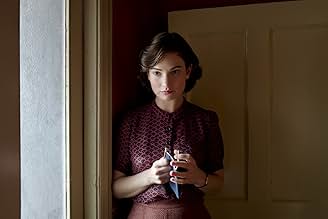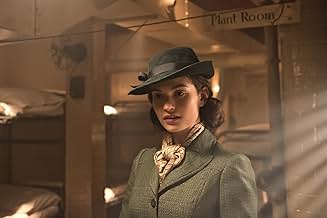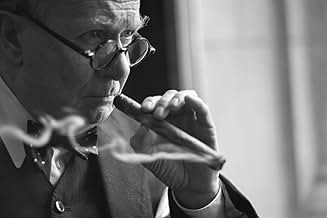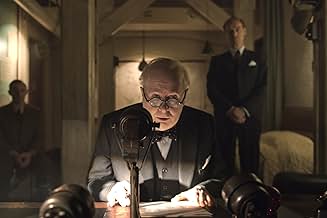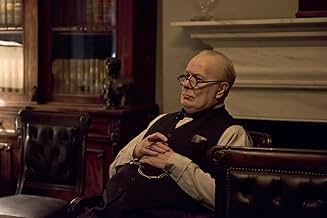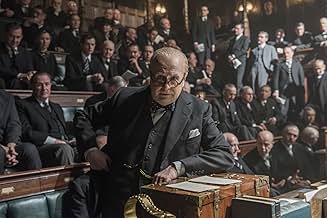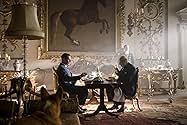En mai 1940, le destin de l'Europe occidentale pèse sur le Premier ministre britannique Winston Churchill, qui doit choisir entre négocier avec Adolf Hitler ou continuer le combat tout en sa... Tout lireEn mai 1940, le destin de l'Europe occidentale pèse sur le Premier ministre britannique Winston Churchill, qui doit choisir entre négocier avec Adolf Hitler ou continuer le combat tout en sachant que cela pourrait représenter une défaite humiliante pour la Grande-Bretagne et son ... Tout lireEn mai 1940, le destin de l'Europe occidentale pèse sur le Premier ministre britannique Winston Churchill, qui doit choisir entre négocier avec Adolf Hitler ou continuer le combat tout en sachant que cela pourrait représenter une défaite humiliante pour la Grande-Bretagne et son empire.
- Réalisation
- Scénario
- Casting principal
- Récompensé par 2 Oscars
- 54 victoires et 81 nominations au total
- Air Chief Marshal Dowding
- (as Adrian Rawlings)
Avis à la une
The film opens with Parliament in open rebellion over Prime Minister Neville Chamberlain's failure to deal with Hitler and the opposition party demanding his resignation. Chamberlain wants Halifax to replace him, another appeasement advocate cut from the same cloth as he, but Halifax refuses saying his "time has not yet come". So Winston's party picks him literally - while holding their noses - because nobody else wants the job. And for good reason. Hitler is knocking over European countries with the ease of dominoes and the entire British army is trapped at Dunkirk, with so many damaged ships blocking the harbor that no other ship can get into it to rescue them.
Next we meet Oldman's portrayal of Sir Winston. He is a man of enormous appetites - food, drink, cigars - and sometimes tremendous temper. His spending brings him to the brink of bankruptcy multiple times. His party doesn't like him. The king resents him for how he advised his brother when he was planning to marry Wallis Simpson. And Chamberlain and Halifax STILL want to appease Hitler and because Churchill does not, they are working to undermine him, particularly with the king.
The film uses two obvious plot devices that are probably not based in fact. One is Churchill's young secretary who at first he scares to death with his tantrums, but later the two become close as he softens his approach with her . The other is a trip into a subway to get "the man on the street's opinion" about Hitler that just seems eye-rollingly over the top. There is a baby that the mother oddly says looks like Churchill, what seems like an interracial couple in 1940, and a woman who, from the way she is dressed, appears to be a socialist. Yet they to a man, to a woman, to a child, encourage Churchill to fight Hitler to the end. This fictitious event seems to be stolen from Shakespeare, but if you must steal, then steal from the best.
Honorable mention has to go to Kristen Scott Thomas as Clementine, Winston's supportive wife who is often overlooked by history. Also deserving mention is Ben Mendelsohn as King George VI, who is portraying a man much more comfortable as monarch than he was portrayed in Then King's Speech, but then this is not his story.
Yes, it is not historically accurate, but if Churchill did confront the situations and people he confronted in this film, he probably would have acted exactly as he was portrayed here.
I knock off one star for not at least TRYING to explain to the audience WHY - with Hitler obviously not trustworthy - members of Parliament would not realize the choice was between slavery and war. The answer is that WWI cost Britain a generation of young men. Literally every British young man who went to war either died or was maimed. And in the end the entire conflict seemed like it had been for nothing. And so many of the British - and more of the Americans - did not want to go through this a second time with the exact same country, not realizing until it was almost too late that the Kaiser was no Hitler.
Now I must point out that I am a retired history teacher and I consider Winston Churchill to be perhaps the greatest politician of the century. So, I clearly have a bias and predisposition towards liking the movie...especially if it's done well. Is it a crowd pleaser? Maybe not, as the average movie-goer (especially teens) might not enjoy this or care a lick about the film.
The story covers only a portion of the month of May, 1940...just before the fall of France during WWII. Prime Minster Chamberlain is about to be tossed out of office, as his appeasement strategy with Hitler has turned out to be completely stupid. In his place, some hope for Churchill to be the next Prime Minister...though some forces are working to depose him as soon as he comes to power. At the same time, the war is going as badly as it possibly can. Can Churchill survive this? Well, of course...duh, it's HISTORY!
The reasons to see this are two big ones....the film has achieved the look of 1940 beautifully and Gary Oldman provides an Oscar- winning performance in the lead. If he is not at least nominated for this top award, I will be completely shocked...and he really managed (along with ample prosthetics) to LOOK and SOUND like the great man. Great job all around...and a perfect film.
The standout in this film really is Gary Oldman, who is as deserving of an Oscar for this performance as any actor ever has been. He toed the line perfectly, giving a powerful and accurate portrayal of Churchill without it every feeling like a gimmick or impression. He quite simply was Churchill. The physical transformation was a part of this, and the costume and makeup departments should be extraordinarily proud of what they achieved, but the majority of the credit goes to Oldman himself. The task at hand for was not an easy one. Churchill's speeches that he tackled perhaps go down as some of the finest in the English language, being so recognisable and quotable, and he delivered them flawlessly. Simply tremendous from Gary Oldman.
What I also thoroughly enjoyed about Darkest Hour was its attention to detail in bringing to life the period. The costumes, sets, score and supporting cast all blended together perfectly to recreate May 1940 so finely. With this alongside Oldman's performance you will get completely lost in this film and the era, perfectly capturing the spirit of the British people at the time. This was demonstrated particularly well during a spectacular scene on the underground, which was a real highlight for the film.
The camera work in Darkest Hour also stands out as we navigate the murky and claustrophobic tunnels of the Cabinet War Rooms, which adds to the sense of the British having their backs against the wall, trapped by the Germans.
If you love history, fine acting, and accomplished cinema, look no further than Darkest Hour.
Le saviez-vous
- AnecdotesGary Oldman spent a year studying Sir Winston Churchill and his mannerisms before starting on this movie.
- GaffesBlackout restrictions were imposed starting in September 1939 and strictly enforced, requiring all vehicles to be fitted with slotted covers that only allowed a tiny sliver of light to be directed downwards toward the road. However, all the vehicles in the street scenes had fully exposed headlights.
- Citations
Winston Churchill: You cannot reason with a tiger, when your head is in its mouth!
- Crédits fousAt the end of the closing credits the Big Ben clock is heard striking.
- ConnexionsFeatured in CTV National News: Épisode datant du 7 septembre 2017 (2017)
Meilleurs choix
- How long is Darkest Hour?Alimenté par Alexa
Détails
- Date de sortie
- Pays d’origine
- Site officiel
- Langues
- Aussi connu sous le nom de
- Las horas más oscuras
- Lieux de tournage
- Sociétés de production
- Voir plus de crédits d'entreprise sur IMDbPro
Box-office
- Budget
- 30 000 000 $US (estimé)
- Montant brut aux États-Unis et au Canada
- 56 468 410 $US
- Week-end de sortie aux États-Unis et au Canada
- 175 006 $US
- 26 nov. 2017
- Montant brut mondial
- 150 847 274 $US
- Durée
- 2h 5min(125 min)
- Couleur
- Mixage
- Rapport de forme
- 1.85 : 1







